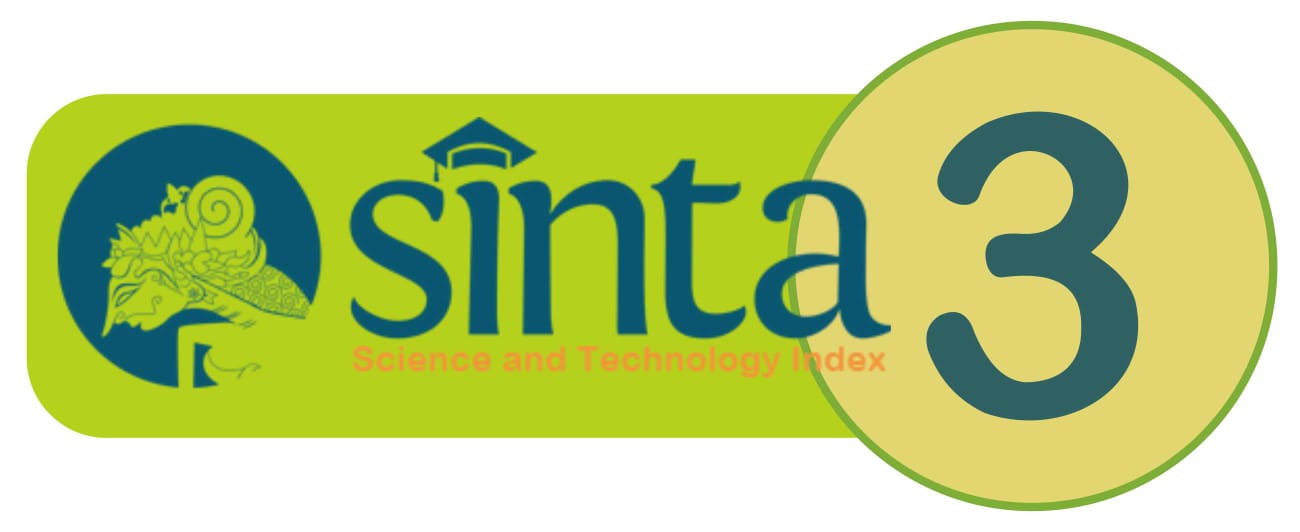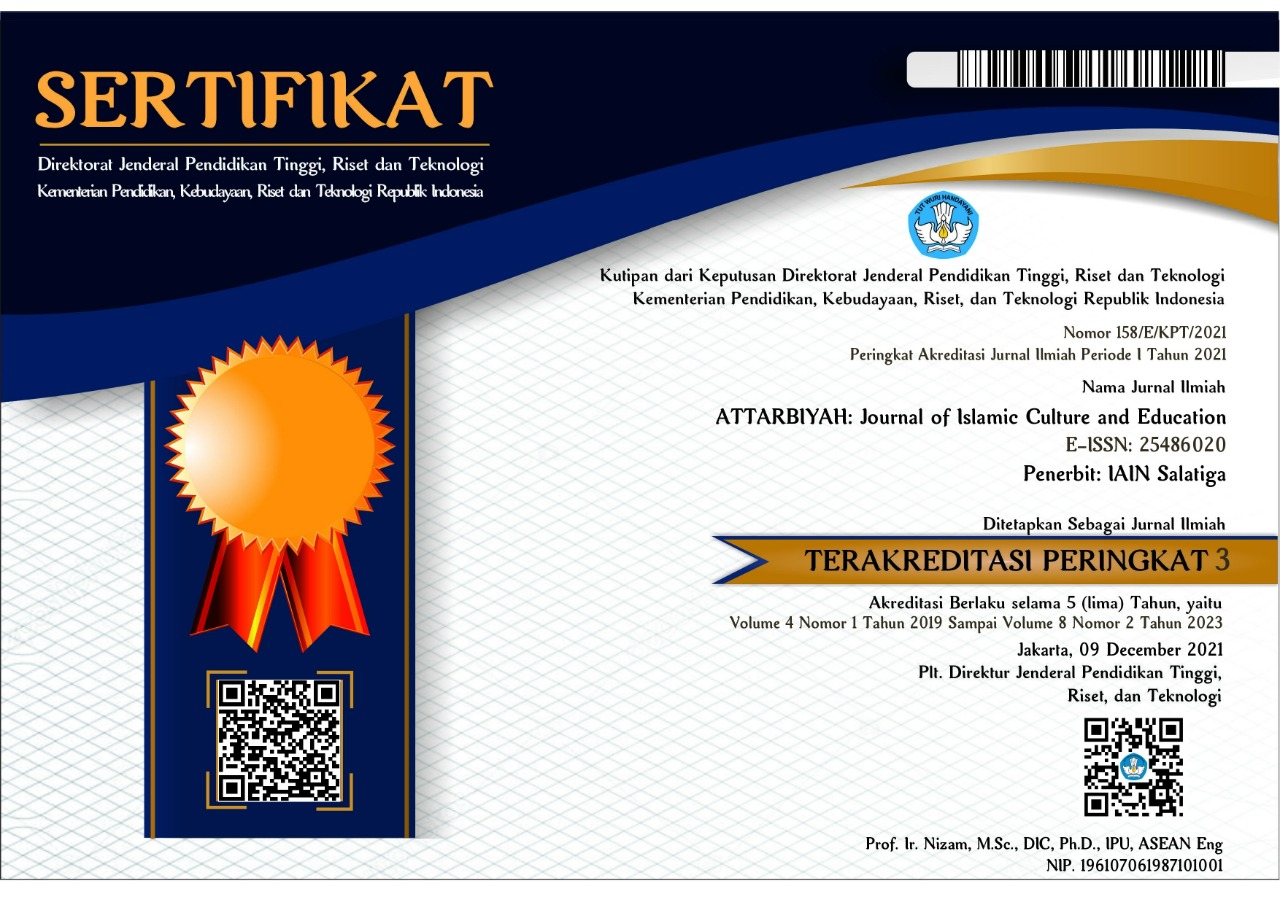The design of Islamic worldview in preventing radicalism at the University of Muhammadiyah Gresik
Abstract
Keywords
Full Text:
PDFReferences
Amirudin, N., (2018). Filsafat Pendidikan Islam. Gresik: Caremedia Communication.
Al-Utsaimin, M. S., Kitab al-'Ilm. Maktabah Nur al-Huda, t.t.
Arifin, S., (2016). Islamic religious education and radicalism in Indonesia: strategy of deradicalization through strengthening the living values education, (IJIMS) Indonesian Journal of Islam and Muslim Societies, 6(1), 93-126. Https://doi.org/10.18326/
ijims.v6i1.93-126.
Arifin, S., Mughni, S. A., & Nurhakim, M., (2022). The Idea of Progress Meaning and Implication of Islam Berkemajuan in Muhammadiyah. Al-Jāmi'ah: Journal of Islamic Studies, 60(2), 547-584. https://doi.org/10.14421/ajis.2022.602.547-584.
Bamualim, C. S., et.al., (2015). Kaum Muda Muslim Milenial Konservatisme, Hibridasi Identitas, Dan Tantangan Radikalisme. Tangerang: Pusat Kajian Agama dan Budaya UIN Syarif Hidayatullah Jakarta.
Biyanto. (2015). Pluralism in The Perspective of Semitic Religions, Indonesian Journal of Islam and Muslim Societies (IJIMS), 5(2), 255-282. Https://doi.org/10.18326/ijims.v5i2. 255-282.
Bruinessen, M. v., (ed)., (2013). Contemporary Developments in Indonesia Islam: Explaining the Conservative Turn. Singapore: Institute of South East Asian Studies.
Hasan, N., et.al., (2013). Narasi dan Politik Identitas: Pola Penyebaran dan Penerimaan Radikalisme dan Terorisme di Indonesia, Laporan Penelitian. Yogyakarta: Fakultas Syariah dan Hukum UIN Sunan Kalijaga bekerjasama dengan FKPT dan BNPT.
Hosen, N., (2018). “Benarkah Nabi Marah Kalau Agama Allah dihina?”, dimuat dalam http://nadirhosen.net/tsaqofah/syariah/benarkah-nabi-marah-kalau-agama-allahdihina (Diakses 27 Januari 2023).
Husaini, A., (2013). Filsafat Ilmu Perspektif Barat dan Islam. Jakarta: Gema Insani.
Husaini, A., (2022). Beginilah Pendidikan Nasional Yang Ideal; Konsep, Aplikasi, Tantangan dan Solusinya. Depok: Yayasan Pendidikan Islam At-Taqwa Depok.
Hwang, J. C., (2009). Why Terrorists Quit: The Disengagement of Indonesian Jihadists. Ithaca: Cornell University Press.
Jamal, M., (2000). “Al-Ijtihad bayn al-Nass wa al-Waqi',” in Ahmad Raysuni and Muhammad Jamal Bayrut, Al-Ijtihad: al-nass, al-waqi', al-maslahah, Bayrut: Dar al-Fikr al-Mu'asir & Dimashq: Dar al-Fikr.
Kamus Besar Bahasa Indonesia (KBBI), (2016), [Online] Available at:
http://kbbi.web.id/dekat (Diakses 30 Januari 2023).
Mbai, A., (2014). Dinamika Baru Jejaring Teror di Indonesia dan Keterkaitannya dengan Gerakan Radikalisme Transnasional. Jakarta: AS Production Indonesia.
Menchik, J., (2016). Islam and Democracy in Indonesia: Tolerance Without Liberalism. New York: Camridge University Press.
Nasution, S., (1988). Metode Penelitiani Naturalistik-Kualitatif. Bandung: Tarsito.
Nazir, M., (2010). Metode Penelitian. Jakarta: Ghalia Indonesia.
Porta, D. D., & LaFree, G., (2012). Processes of Radicalisation and De-Radicalisation, The International Jaournal of Conflict and Violence, 6 (1). https://www.ijcv.org/index.php/ijcv/issue/view/249/111.
Rahardjo, M., (2018). Memahami Kembali Studi Kasus, Makalah Bahan Kuliah Metodologi Penelitian Pascasarjana UIN Maulana Malik Ibrahim. Diakses tanggal 7 Maret 2023 http://repository.uin-malang.ac.id/11327/1/11327.pdf.
Ridwan, W., (2021). Policing Terrorism: Pendekatan Pencegahan Ekstremisme Agama Dan Terorisme. INDEPENDEN: Jurnal Politik Indonesia dan Global, 2(1), 41-50. https://doi.org/10.24853/
independen.2.1.41-50.
Ridwan, W., & Murod, M., (2022). Irisan Motif Ancaman Terorisme: Studi Kasus Penegakan Hukum Densus 88 Anti Teror Di Yogyakarta, Surabaya Dan Makassar Tahun 2021. INDEPENDEN: Jurnal Politik Indonesia dan Global, 3(1), 15-24. https://doi.org/
24853/independen.3.1.15-24.
Schmid, A. P., (2013). Radicalisation, De-Radicalisation, Countre of Counter Terrorism (ICCT), Research Paper, The Hague, March.
Sholeh, B., (2018). Ekonomi Kaum Muda Dan Kebijakan Kontraterorisme. Yogyakarta: Pustaka Pelajar.
Suharsimi, A., (2002). Prosedur Penelitian Suatu Pendekatan Praktek. Jakarta: Rineka Cipta.
Sugiyono. (2015). Metode Penelitian Pendidikan: Pendekatan Kuantitatif, Kualitatif, dan R&D. Bandung: Alfabeta.
Wildan, M., et.al., (2019). Menanam Benih di Ladang Tandus: Potret Sistem Produksi Guru Agama Islam di Indonesia. Yogyakarta: Center for the Study of Islam and Social Transformation UIN Sunan Kalijaga.
Wildan, M., (2013). The Nature of Radical Islamic Groups in Solo. Journal of Indonesia Islam, 7(1), 49-70. DOI: 10.15642/
JIIS.2013.7.1.49-70.
DOI: https://doi.org/10.18326/attarbiyah.v8i1.93-105
Refbacks
- There are currently no refbacks.

ATTARBIYAH: Journal of Islamic Culture and Education by http://attarbiyah.iainsalatiga.ac.id/ is licensed under a Creative Commons Attribution-ShareAlike 4.0 International License
----------------------------------------------------------
ATTARBIYAH : Journal of Islamic Culture and Education IAIN SALATIGA p-ISSN: 0215-9996, e-ISSN: 2548-6020



